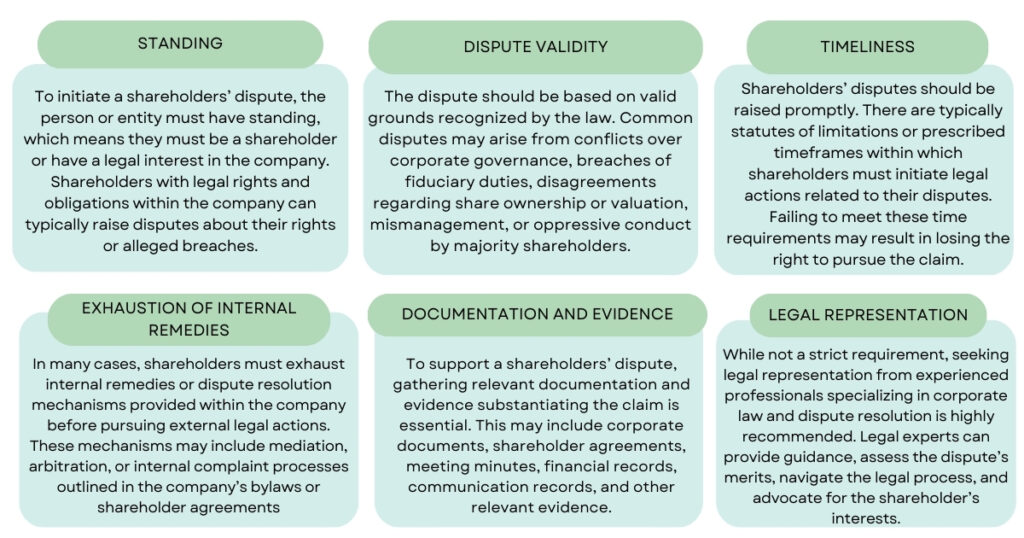Call us now:

Shareholders disputes in Thailand
Thailand is among the countries where the flourishing and dynamic business attracted numerous investors. However, shareholders dispute in Thailand may occasionally arise, marking an important challenge for both companies and people involved in them. When shareholders of a particular company become in conflict, they may affect performance, hinder growth, and create an overall adverse environment. In Thailand, it is important to know what causes such disagreements, as well as existing legal background and effective strategies of their resolution to provide successful operations and prevent stakeholder-related problems.
Table of Contents
What are the regulations concerning shareholders dispute ?
In Thailand, shareholders dispute regulations are mostly governed by the Civil and Commercial Code and the Securities and Exchange Act. Order to resolve any conflicts that might arise and to ensure preservation of shareholders’ rights there are a number of rules put in place. Some of the key points regarding such rules are:
Shareholder Agreements Shareholders are allowed to enter into certain agreements that will regulate their rights and duties vise a versa the company. Such agreements may be about the number of shares owned, voting rights, dividends process, managing the company, and, most importantly, the method of dispute resolution. These agreements are a usual and fairly important way to resolve disputes as the parties would have a legal obligation to perform certain duties.
Corporate Governance Civil and commercial codes as well as the Securities and Exchange Act regulate corporate governance matters. Overall, these rules are aimed at ensuring the creation of fair and open company actions scheme. They regulate duties and rights of the company, directors, and shareholders and constitute a legal basis in case of fiduciary duties and improper conduct breach.
Share Valuation These disputes usually arise upon transfers, purchase or acquirement of shares as well as dilution of such shares. The disputes might be due to the difference of opinions about the value of the shares and their stakes. As Civil and Commercial Codes provide means of determine fair value of shares. Ways of resolving such disputes include involving experts and detailing the methods to be used.
Mediation, Arbitration and Litigation: The rules recognize the variety of ways to peacefully and legally resolve disputes. First, is the mediation, which means using a form of facilitator to assist the parties in reaching an agreement, this is not an official and binding among of dispute resolution. Arbitration is a legitimate measure where an arbitrator or the arbitration panel will make a binding resolution based on the arguments and evidence presented by disputing parties. Litigation is the last honeymoon resort meaning that disputes will be settled by the courts.
Minority Shareholders Protection: The codes provide certain measures and tools in order to protect minority shareholders. Such shareholders are safeguarded against oppressive and unfair conduct of their majority or managers. Such means include the right to challenge and/or object the unlawful action; remedies for breach of rights and application for an inquiry of company business.
Get expert legal guidance.
What law applies ?
In Thailand, the laws that are mainly applicable for the shareholders dispute of interest are the Civil and Commercial Code and the Securities and Exchange Act. Those laws are regulating the general legal framework governing the shareholders’ conflict of interest and their rights. Below is a brief description of these fundamental laws. The Civil and Commercial Code is the main civil law of Thailand, defining legal relationships related to contracts, property, obligations, business entities and company registration. This law also describes partnerships, limited partnerships, and private and public companies’ means, formation, operation, and liquidation, and the shareholders’ rights and duties. The relevant parts of it include :
Sections 1096 to 1266 : Regulations on partnerships, limited partnerships, and private limited companies.
Sections 1267 to 1493 : The provisions on public companies, including their means, formation and management; also, these sections describe shareholder rights and duties;
Sections 1501 to 1547 : Provisions on share transfers, issuance of certificates, and their related shareholders’ business.
The Securities and Exchange Act is the law regulating the issuance, transactions, and disclosure of securities. It also describes the regulations of the public companies and aims to protect the investors at the securities market and ensure the conditions for the fair and open source of capital. The relevant parts of this act include:
Part 3 : Regulation of public companies, including a prescription of their shareholder’s meeting, procedures of voting, and disclosure obligations.
Part 8 : This part is related to the penalties and enforcement related to violation of the Securities and Exchange Act definitions and ensures possible actions related to fraud securities, insider trading, and market manipulation.
What are the requirements for shareholders dispute ?
Regarding shareholders dispute in Thailand, there are specific requirements and considerations to be aware of. While specific requirements can vary based on the conflicting nature and the applicable laws, here are some general aspects to consider :

